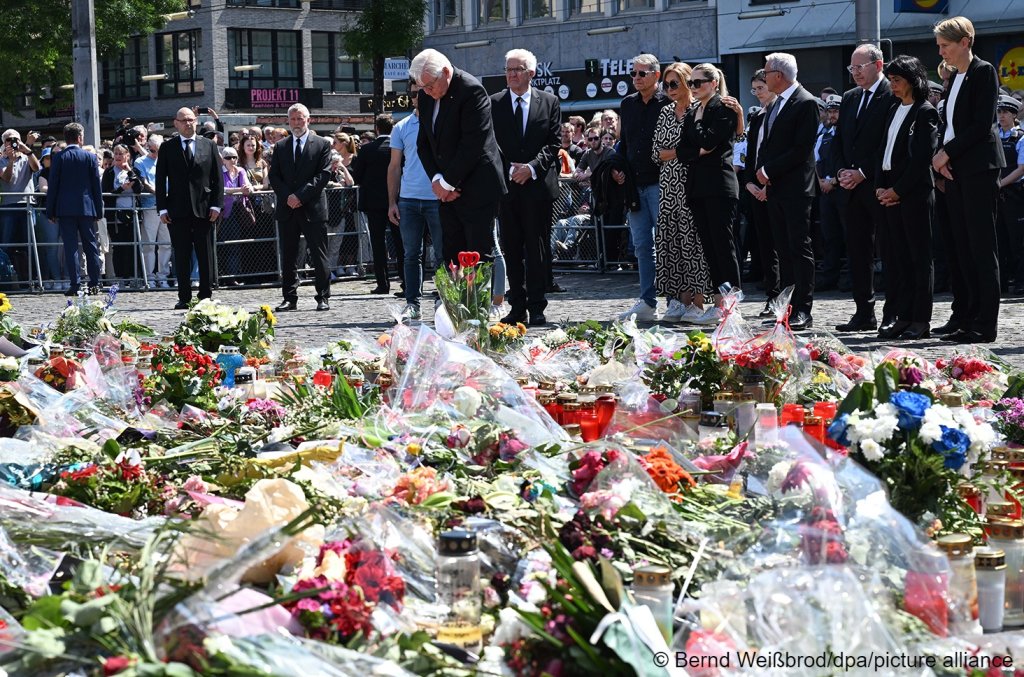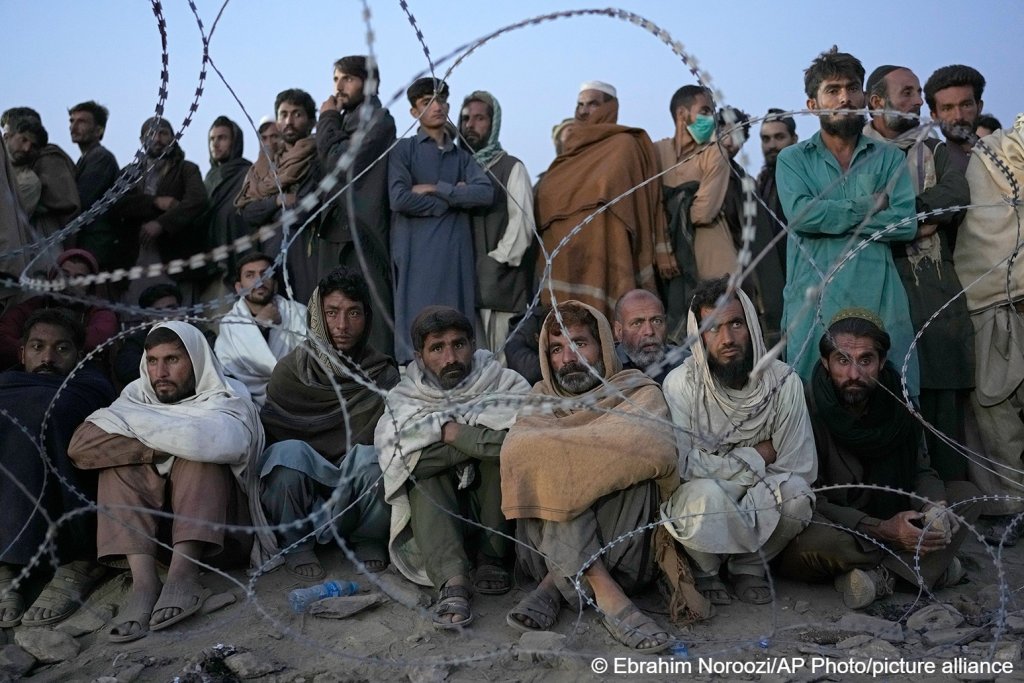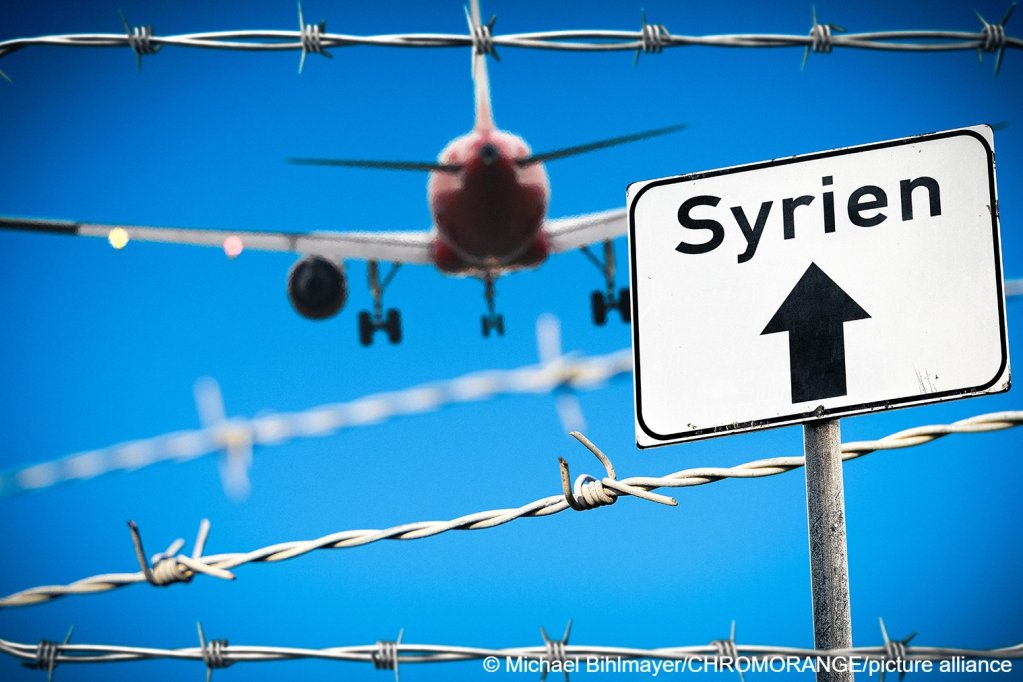German Chancellor Olaf Scholz has said he will deport convicted criminals from Afghanistan and Syria, following last week's knife attack in Mannheim, carried out by an Afghan man. The Taliban say they are ready to begin talks with Germany over the issue.
In a speech to parliament on Thursday (June 6), German Chancellor Olaf Scholz said he supports resuming deportations to Afghanistan and Syria of immigrants convicted of crimes in Germany.
In response, the Taliban said they would be "open to cooperating with the German government on the deportation of Afghan criminals back to their home country," reported the German news agency dpa.
A spokesperson for the Taliban's foreign ministry, Abdul Kahar Balchi, called on German officials to address the issue through "normal consular engagement." On the media platform X he added that he "expressed hope that both countries could manage the matter through normal diplomatic channels."
Germany, like most Western nations, no longer has a diplomatic presence in Afghanistan.
Since the Taliban took over in 2021, Germany has not deported anyone to that country. Before that, only men and only convicted criminals or those deemed to pose a terrorist threat could be deported.
'Outrage'
Scholz's comments came a few days before elections for the European Parliament, which began on June 6. Migration is one of the main themes of this year’s European elections, with expectations that far-right anti-migration parties may make gains in the parliament’s make-up.

Speaking to the German parliament, Scholz received applause when he said: "It outrages me when someone who has sought protection here commits the most serious crimes. Such criminals should be deported, even if they come from Syria and Afghanistan."
"Serious criminals and terrorist threats have no place here," said Scholz. "In such cases, Germany’s security interests outweigh the interests of the perpetrator."
Knife attack in Mannheim
Last week an Afghan migrant launched a knife attack in the southern city of Mannheim, leaving one police officer dead and four others injured. The attack took place during a political rally for the Islam-critical party Bewegung Pax Europa (European Peace Movement) BPE. The leader of BPE Michael Stürzenberger was also injured during the attack.
Another police officer stopped the attacker by shooting and wounding him. He has not yet been declared fit enough to undergo interrogations.
According to reports, the 25-year-old Afghan man arrived in Germany in 2014 as a young asylum seeker. German national broadcaster ARD reported last week that he was married with two children and lived in the nearby state Hessen. Before carrying out the attack, police say he had not been on their radar.
Police are investigating whether he had Islamist motives for the attack.
Also read: German lawmakers pass bill seeking faster deportations
On Friday, a minute’s silence was held in Mannheim to remember the dead police officer Rouven Laur. Germany’s President Frank-Walter Steinmeier laid flowers at the spot where he was attacked.

Finding ways around the difficulties of deportation
Germany and Europe’s politicians are becoming more united on the issue of allowing for the deportation of serious criminals, even to countries that have a deportation stop placed on them, such as Afghanistan or Syria.
Scholz said he believed that "what happened in Mannheim…is an expression of the misanthropic ideology of radical Islamism. There is only one term for this: terror. Let’s declare war [on] terror," reported AP.

Previously, it has been difficult for European countries to deport foreign nationals, even criminal offenders, to countries with which they have no diplomatic relations, or to places considered too unstable or dangerous.
But Scholz has promised that his government is already working on solutions to solve these problems. According to AP, the German government has also been in discussion about allowing deportations to Syria again.
Also read: What do Germany's migration partnerships entail?
Scholz has promised his government will also toughen the deportation rules for people of any other nationalities who commit or support terrorism.
Are deportations realistic?
However some, even within the coalition government, have questioned how realistic the chancellor’s deportation plans actually are. Britta Hasselmann, the Greens' parliamentary leader told AP that she thought it might be difficult to negotiate a deportation agreement with the Taliban or even any of Afghanistan’s neighboring countries.
"It will have to be […] examined for which third country it should be attractive to take in terrorists or serious criminals. I am looking forward to seeing what answers we come up with," Hasselmann said.
The far-right Alternative for Germany (AfD) party, which is opposed to immigration, called for an end to migration from Afghanistan and said it must be possible to return people to that country.

Some members of the youth movement from the party demonstrated in Mannheim under a banner reading "Remigration would have prevented this crime."
Ideas about so-called "remigration" caused fierce political debate at the end of last year, when it was revealed that some AFD members had met with far-right proponents from around Europe to discuss ideas about returning people to their home countries, including in some cases people who now hold a German passport.
Also read: Germany, criticism against ending the ban on deportations to Iran
Pro Asyl argues against deportation
The German NGO Pro Asyl that advises and campaigns for migrants, asylum seekers and refugees said deportations to countries such as Afghanistan and Syria are against human rights. In a press statement they said that in both countries "instances of torture and human rights infringements" had been reported.
Pro Asyl admitted that the feeling of "shock" after the Mannheim attack loomed large. "Islamic terror, right-wing extremism and antisemitism are a problem for German democracy. Anyone found committing crimes must be punished with the full force of German law," the statement said.
Also read: What's changing in German immigration policy in 2024?
"But deportations to countries where torture, abuse and further human rights abuses are threatened is not possible from a country like Germany," it continued.

The organization said that under European and German law, sending anyone to a place where they might be tortured was absolutely forbidden and "applies to all people, even those who may have committed crimes. Any crimes committed must be punished in Germany."
According to Pro Asyl, a UNHCR report on Afghanistan under the Taliban underlines that many of the human rights abuses in the country remain unreported and undocumented. The UNHCR has also called upon all countries to avoid deporting people to Afghanistan.
Syria is 'a torture state,' according to Pro Asyl
Pro Asyl also cites a report from the European Asylum Agency written about Afghanistan in May 2024 stating that there was no part of Afghanistan that could be considered safe for deportations.
The organization also underlines that Syria should continue to be considered a "torture state." The statement says that Syria under its leader Assad has been carrying out torture for years, "disappearing people, or imprisoning them without charge, or even killing them." Reports from UNHCR, Amnesty International and several other international organizations concur.
Also read: Cyprus and seven other EU states call for deportations to Syria
According to media reports, even Germany’s foreign ministry has reported "at the moment, the safe return of refugees to Syria cannot be imagined, or properly checked." Pro Asyl states that the foreign ministry report refers to more than 100,000 people who have been disappeared in Syria.

At the end of May, the EU’s foreign affairs representative Commissioner Josep Borrell said, "while the EU would wish that returning home could be a realistic option for all refugees, everywhere and always, we concur with the UN system that, currently, the conditions for safe, voluntary, and dignified returns to Syria are not in place.We insist that it is the Assad regime that bears the primary responsibility for putting in place these conditions. You can count on our steadfast support, but we expect our partners to uphold international law –including the principle of non-refoulement—and reject and condemn any forced deportations."
Fear and worry echo across migrant communities
Some of those who work on the ground with asylum seekers and refugees in Germany have told InfoMigrants that when politicians start talking about deportations, it sends fear throughout that country’s migrant community, even when most have never committed a crime.
In 2019, Der Spiegel wrote about the failing system of deportation in Germany, highlighting "Germany’s absurd administrative complexity" which it said hindered many of the country’s deportation attempts.

In 2018, Germany deported 23,617 people, but that same year there were 30,921 failed deportation attempts. "This was because people got sick, went missing suffered some ill stroke of fate or because court orders got in the way," wrote Der Spiegel.
"There were 7,849 cases of 'unsuccessful delivery on the day of flight' and 3,322 times ongoing repatriation attempts had to be aborted due to 'denial of transportation,' 'active or passive resistance,' 'unsuitability for air travel,' or 'legal appeals.'"
Deportations seen as 'bad for everyone'
Deportations are "bad for everyone," said the article in Spiegel, adding that, anecdotally, "high-ranking officials estimate that a large number of deportees return to Germany sooner or later to try their luck anew."
The Berlin Refugee Council has called some of the repatriations "horror deportations." The organization reportedly told Spiegel that on a deportation flight from Germany to Spain in 2018, a woman was tied up and carried on to the plane in front of her screaming small children. The Refugee Council also claimed that another woman had been hit, and a man who was mentally disabled appeared to have been sedated.
Berlin’s state government at the time said that the "general accusations of physical violence cannot be confirmed." But according to Spiegel, between January and November 2018, "restraints or tethers were used on such flights roughly 300 times."
"Five foreigners were forced to wear head or bite guards because they kept resisting transport." Spiegel also said that police escorts "regularly find razor blades in shoe soles or in people’s mouths, which deportees use to injure themselves."
Spiegel reports that the desperation is very real. For many, "repatriation is a matter of life or death."
With AP and dpa
